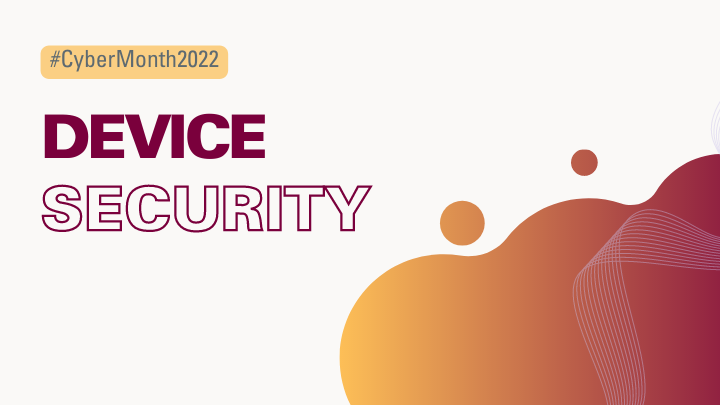McMaster cyber heroes’ series | Level up your device security game with simple habits

McMaster cyber heroes use all sorts of tools to keep their identities safe from cyber villains. As their villains’ threats and attempts continue, keeping their devices safe and secure is one of the many challenges McMaster cyber heroes are facing. This week, Em, Dr. Eff, and Ay will get support from their secret sidekicks who will help them with their device security.
Browsing Safely
Here are some adventures and incidents as shared by McMaster cyber heroes. These stories are a reminder to keep safe browsing in mind while watching your favorite cat videos on YouTube, researching online for that class presentation, filling out a grant proposal or writing a time sensitive report to your boss.
Em and the Amazon purchase
Em has the day off, and they decide to purchase that adorable cat pillow they’ve always wanted. Unfortunately, both their laptop and phone weren’t working for them that day and there was only an hour left to get the pillow at 75% off! Em decides to go to the campus and use the computer in the library to purchase the pillow. They log into their Amazon account to make the purchase. Their cyber senses tell them to deny the remember me request and the web browser’s notification to save their password for the website, and that’s what Em does! Em buys the pillow and makes sure to log out of their Amazon account.
Dr. Eff and the shadowy caller
Dr. Eff is working on their research grant proposal on fungi and suddenly receives a phone call on their office desk from who claims to be another researcher named Dr. Myers. The caller says they met Dr. Eff at the annual fungal conference last year and compliments Dr. Eff on their outstanding presentation at the conference. Dr. Myers asks Dr. Eff to visit a website and donate a portion of their research money so that their name in mentioned on Dr. Myers’ research paper. Dr. Eff trustingly navigates over to Dr. Myers website; however, it is asking for the bank account number along with their Health Card number. Dr. Eff cyber senses kick in and immediately closes the website, hangs up the phone on the person pretending to be Dr. Myers and reports the event to McMaster IT Security to investigate.
Ay and risky Wi-Fi connections
Ay’s manager has approved they work remotely while attending an Administrative Professional Development conference in Great Britain. Ay is staying at a nearby hotel that’s within walking distance to her event. Before travelling abroad Ay checks UTS’ Guide for International Travel to ensure following the best practices for the devices they’re taking with them abroad. One practice for example is updating the web browsers and installing the latest operating system updates.
When Ay attempts to connect their laptop to Wi-Fi to check their email and finish some tasks, they find several Wi-Fi options to connect to. Some of these options sound legitimate, while others seem very conspicuous. Examples of some of these networks are HOTEL-FREE (Unsecured), VIRGINMEDIA-4510 (Secured), SKYBB-4416 (Secured), HOTEL-GUEST (Secured), HOTEL-EMP (Secured), NETGEAR-2022-10 (Secured)
Ay thinks the HOTEL-FREE Wi-Fi network is a safe option and connects their device to this network. Soon after, numerous security warnings pop-up on their screen claiming that their connection is unsecure. Another window pops-up asking Ay for their MacID and password to accept the terms of agreement to access hotel internet. Ay’s cyber senses kick-in and they proceed to contact the hotel front desk and confirm if the network they’re connected to is the legitimate one. The hotel attendant confirms that this Wi-Fi network is illegitimate and will follow-up with their IT personnel to rectify the issue. The attendant verifies that the HOTEL-GUEST (Secured) Wi-Fi is the official hotspot used by hotel guests. Ay proceeds to connect to it to view their emails and complete their tasks.
Ay did the right thing, however if their cyber senses failed and they had provided their MacID and password; Ay would need to report her claim to the UTS Service Desk.
Keeping devices software up to date
Here are three more adventures because McMaster cyber heroes want to make sure we are safe.
Beside the many habits we have learned from our McMaster cyber heroes to stay cyber secure over the past three weeks, there are key ones that we sometimes overlook despite their importance.
The following habits are critical for our identity security and safety: keeping the devices software up to date, regularly checking for updates once a month and restarting the devices. Keeping your devices up to date with the latest software and firmware will ensure that your software and devices are secure and working correctly!
Em is busy but cyber villains are too
Em has been busy. They’ve had non-stop online lectures and classes throughout this week. There’s been a notification popping up for the past few days asking Em to restart their laptop for a software update.
This update is sent from Em’s secret sidekick who has been working on keeping Em’s laptop safe from ever adapting cyber villains. If Em doesn’t allow their laptop to update, cyber villains could find an exploit and discover their secret information. Em restarts their laptop, allowing it to update, effectively shutting out the newest cyber villain exploit.
Dr. Eff has a hero: antivirus
Dr. Eff, whether they’re in superhero or citizen mode, visits plenty of websites, clicks links, and downloads files. They’re busy with work, but luckily their secret sidekick has installed anti-virus and security software on their computer, which scans all these files before Dr. Eff opens them to see whether they’re safe to open.
Ay vs. the zoom-bombs
Ay has an important video conference coming up on Zoom, but their meetings aren’t connected. That’s strange. Their secret sidekick taps them on the shoulder and asks, “Have you updated to the latest version of Zoom? Not only is this important for making sure Zoom works properly, but it also keeps nefarious cyber villains from Zoom-bombing you.” Great tip, super sidekick! Ay updates their Zoom to the latest version and the meeting connects safely again.
Super Cyber Security Takeaways
Adopting habits such as safe browsing and keeping the devices up to date is crucial. Having safe browsing habits is like being aware of your surroundings when you walk alone at night. Also, we all have devices that we use on a day-to-day basis, from our phones to laptops to smart devices. Our devices are constantly improving and becoming more sophisticated, as are the threat actors that work to thwart them. When updating your devices, you’re adding another level of security to your devices and data.
Here are the key takeaways from this week’s McMaster cyber heroes’ adventures:
- Ensure that your online information is safe and secure in a public setting
- Make sure the URLs you visit are legitimate
- Trust and verify with the individuals that contact you initially asking for a favor
- Keep your devices up to date to guarantee the latest firmware and patches have been applied, thereby making the devices more secure.
Reminder
Spot the cyber cat throughout the month in stories by McMaster IT. Each week, cyber cat will appear in one of the stories. If you spot cyber cat that week, let us know here where in the world is cyber cat. Each time you get it right, you’ll be entered for a chance to win a prize from the McMaster Campus Store!
News CategoryRelated News
News Listing

Enhancing Digital Security: National Cyber Security Awareness Month 2024
NCSAM, News Category
October 8, 2024

New Data Governance Council will help shape data frameworks
IT Governance News, News Category
August 22, 2024

